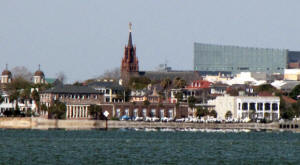If located there, many of the 3,500 or so passengers on a Carnival cruise ship departing from Charleston would be likely visitors to the aircraft carrier Yorktown, the national Medal of Honor Museum and other attractions. And it would serve also as the pier for the more upscale cruise ships that visit the Holy City. With the often cited need for more revenue to put Patriots Point on an even keel, such a move could be a win-win situation.
A ferry boat could provide a trip across the
harbor with memorable views for visitors to the Holy City,
 with CARTA buses across the Ravenel Bridge as an alternative choice.
Many would likely stay overnight at Mount Pleasant motels, as
well as patronizing local restaurants on both sides of the
bridge.
with CARTA buses across the Ravenel Bridge as an alternative choice.
Many would likely stay overnight at Mount Pleasant motels, as
well as patronizing local restaurants on both sides of the
bridge.
Properly done, such a move would likely take Charleston off the National Trust for Historic Preservation's "watch" list, retain the city's history-enhancing skyline, and quite possibly end the environmental lawsuit against Carnival Corporation. It could also open all of the Union Pier waterfront for development. Sale of that property could well provide the Ports Authority more than $100 million. That would significantly reduce interest on future bonds for expanding facilities for the Port's main business of receiving and shipping commercial goods via transport vessels.
Such a move might well be welcomed by all, including state Sen. Chip Campsen, whose current district includes much of Mount Pleasant and extends well into the Charleston Historic District. Rep. Chip Limehouse, vice-chairman of the county's legislative delegation and its only member who resides in the historic district, says the Patriots Point idea is worth considering.
Rather than a legislative solution, however, a sit-down meeting between county legislative leaders, which might well involve House Speaker Bobby Harrell and Senate Majority Leader Glenn McConnell, and the board of the state Ports Authority, might lead to common ground for dissolving ongoing public conflicts and objections.
It could even result in a study by a neutral expert on port operations and development, whose recommendations would be adopted if approved by a majority of the Ports Authority's board.
Mayor Summey's suggestion might actually remove a big headache for Charleston Mayor Joe Riley. In "The Changing Economy" chapter of my recent book "The Palmetto State," I wrote, "The farsighted South Carolina Ports Authority has served as a major force in transforming the state economically."
An amiable resolution of the cruise ship controversy would reinforce that assessment.
The city was settled on principles of religious tolerance and embraced diversity and equality. In fact, in 1702, the city's religious community was 42% Anglican, 45% Calvinist, 10% Baptist, and 2.5% Quaker and Jewish. In today's Charleston, the spectacular view of the cityscape dotted with steeples is a reminder of the impact religion once had and still has on the development of the city. You will immediately understand this appropriate nickname when you bask in the view from the Charleston Harbor.




